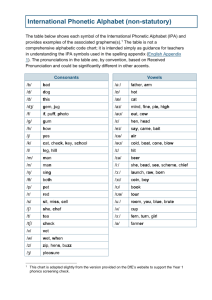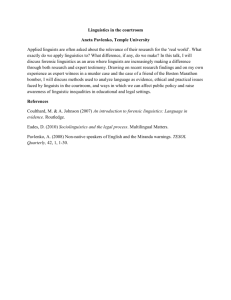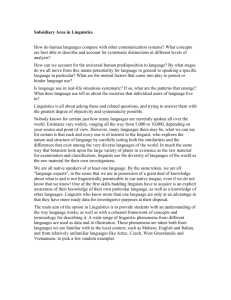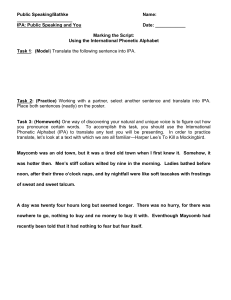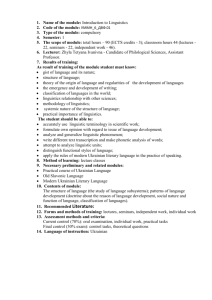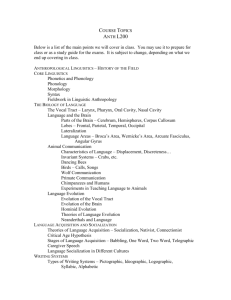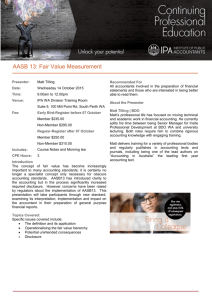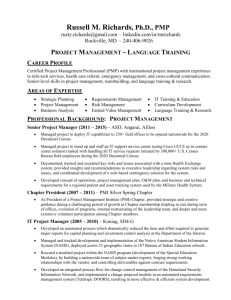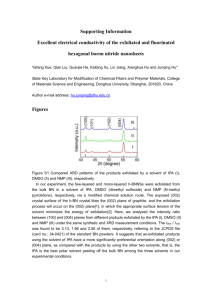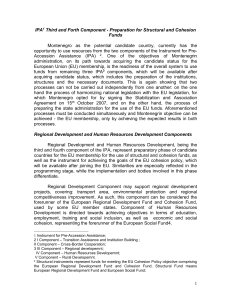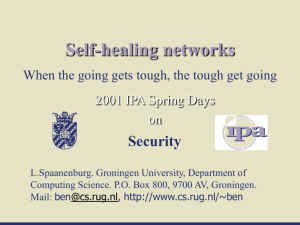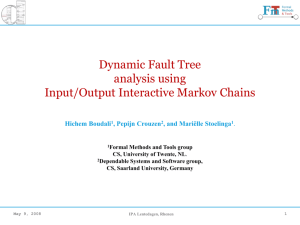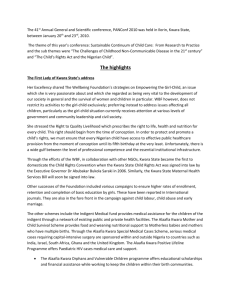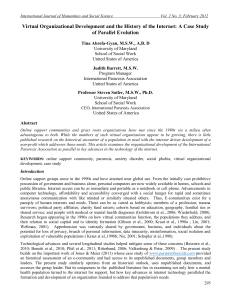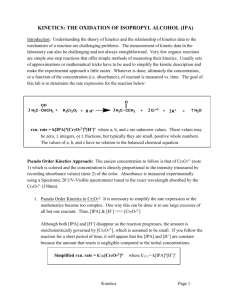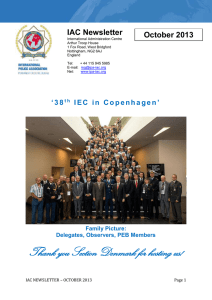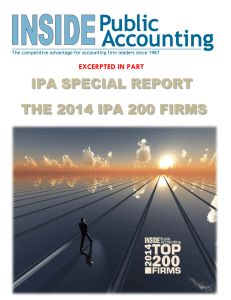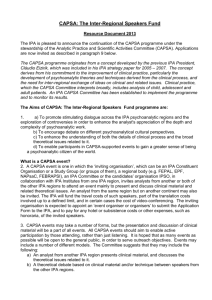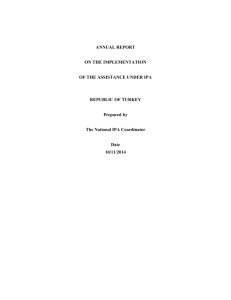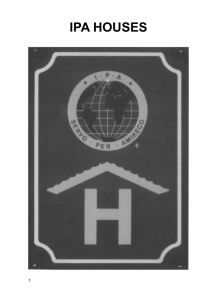Material for Linguistics Clubs
advertisement
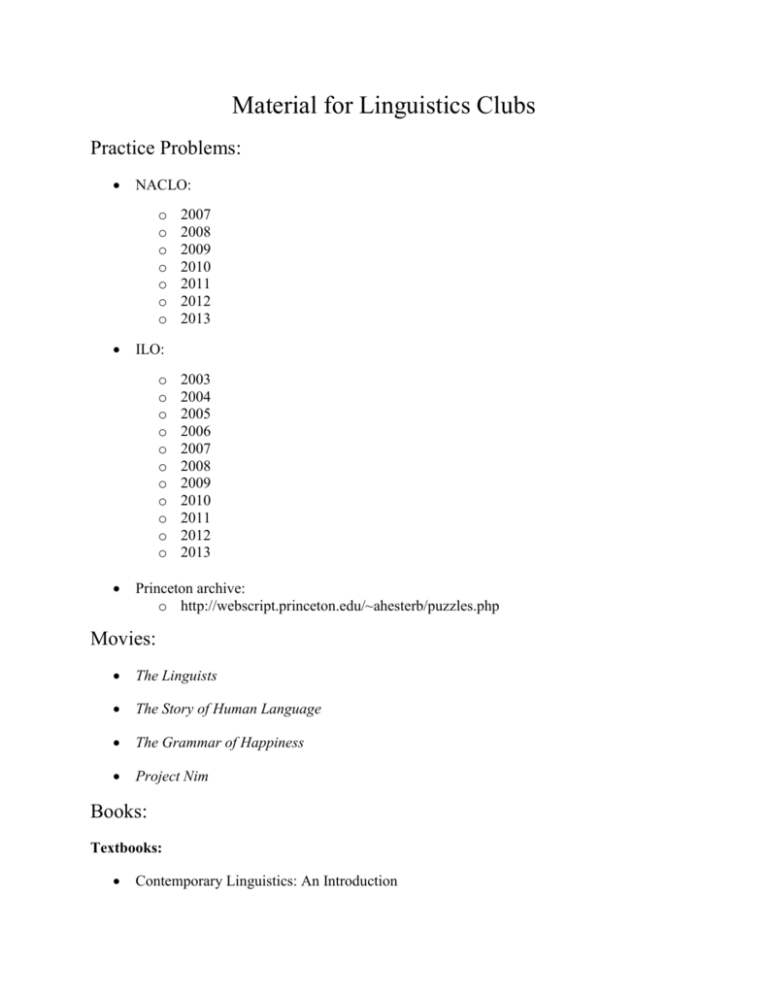
Material for Linguistics Clubs
Practice Problems:
NACLO:
o
o
o
o
o
o
o
ILO:
o
o
o
o
o
o
o
o
o
o
o
2007
2008
2009
2010
2011
2012
2013
2003
2004
2005
2006
2007
2008
2009
2010
2011
2012
2013
Princeton archive:
o http://webscript.princeton.edu/~ahesterb/puzzles.php
Movies:
The Linguists
The Story of Human Language
The Grammar of Happiness
Project Nim
Books:
Textbooks:
Contemporary Linguistics: An Introduction
o By William O'Grady, John Archibald, Mark Aronoff, Janie Rees-Miller
o (Textbook; available in 5th or 6th editions)
An Introduction to Language
o By Victoria Fromkin, Robert Rodman, Nina Hyams
o (Textbook; available in the 8th edition)
Introductory book to linguistics:
Biting the Wax Tadpole
o By Elizabeth Little
o (Excellent introduction to linguistics—about interesting features of languages and
learning languages)
Books about language change:
The First Word
o By Christine Kenneally
The Power of Babel
o By John McWhorter
o (Broadly, about historical linguistics and language change, but there are lots of
interesting tidbits about different languages included as well)
The Unfolding of Language
o By Guy Deutcher
o (About the evolution of language, and the evolution of complexity in language)
Books about language extinction:
Spoken Here
o By Mark Abley
o (About language extinction)
When Languages Die
o By K. David Harrison
o (About language extinctions and interesting features of languages)
Books about writing:
Lost Languages / The Enigma of the World's Undeciphered Scripts
o By Andrew Robinson
o (About scripts which have not been decoded yet)
The Story of Decipherment
o By Maurice Pope
The Story of Writing
o By Andrew Robinson
o (Explains the evolution of writing, in the process explaining how many writing
systems work)
Topical Books:
Bastard Tongues
o By Derek Bickerton
o (About pidgins and creoles)
The Language Instinct
o By Steven Pinker
o (In which he sets forward his view that language is hardwired into the human brain)
The Universal History of Numbers
o By Georges Ifrah
o (Explains everything about the history of numbers, [almost no hyperbole {this book is
very lengthy}])
Web Resources:
Constructed Languages:
AkanaWiki
o http://tzirtzi.ipage.com/akana/index.php?title=Main_Page
o (A website for constructed languages, especially focusing on historical linguistics)
Sentences to Test Constructed Language Syntax
o http://fiziwig.com/conlang/syntax_tests.html
o (A variety of sentences to test the capabilities of a constructed language)
Virtual Verduria
o http://www.zompist.com/virtuver.htm
o (The most famous online constructed language project)
Numbers:
Numbers in over 5000 Languages
o http://www.zompist.com/numbers.shtml
o (The numbers 1-10 in over 5000 languages)
Of Languages and Numbers
o http://www.languagesandnumbers.com/numbering-systems/en/
o (Higher counting in many languages, plus books about many languages)
Orthography / Writing:
Omniglot
o http://www.omniglot.com/
o (A website dedicated to the writing systems, orthographies, and languages of the
world; indispensable)
Sign Language IPA
o http://dedalvs.conlang.org/slipa.html
o (An invented phonetic method to write sign languages, analogous to the IPA for
spoken languages; no system like this one existed previouslz)
Type IPA Phonetic Symbols
o http://ipa.typeit.org/full/
o (For typing the IPA without a special keyboard format)
X-SAMPA
o http://www.theiling.de/ipa/
o (A commonly used, easier-to-type alternative to the IPA)
For Specific Languages:
Ethnologue
o http://www.ethnologue.com/
o (The definitive encyclopedia of the world’s languages)
Open Language Archives Community
o http://www.language-archives.org/
o (More than 100000 language resources for specific languages)
SIL Bibliography
o http://www.ethnologue.com/bibliography.asp
o (A large set of publications representing thousands of languages, many free and
online)
Miscellaneous:
Leipzig Glossing Rules
o http://www.eva.mpg.de/lingua/resources/glossing-rules.php
o (The definitive rules for making glosses of sentences)
LINGUIST List
o http://linguistlist.org/
o (A website containing many resources for linguists, such as MultiTree, a mapping
device for phylogenetic language trees, and lists of dictionaries in many different
languages)
LSA: Linguistic Style Sheet
o http://www.lsadc.org/info/pubs-lang-style.cfm
o (The formatting commonly used throughout the linguistic world)
SIL Linguistic Resources
o http://www.sil.org/linguistics/resources.html
o (Software, fonts, glossaries of linguistic terms, etc.)
Wikipedia
o http://www.wikipedia.org/
o (Free encyclopedia, 282 languages offered)
